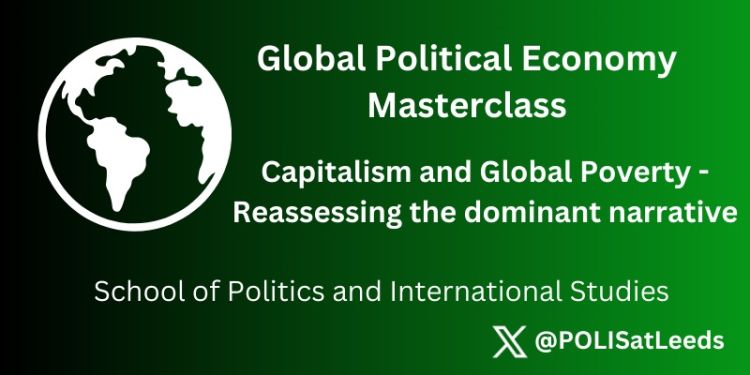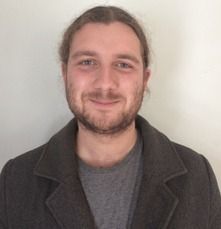Global Political Economy Masterclass - Capitalism and Global Poverty

- Date: Wednesday 24 April 2024, 13:00 – 16:00
- Location: Venue to be confirmed
- Cost: Free
The Global Political Economy group in POLIS is delighted to be hosting an in-person masterclass with the global poverty researcher, Dylan Sullivan (Macquarie University, Sydney).
We are constantly told that the capitalist world-economy has delivered an unprecedented reduction in global poverty. The World Bank and many public intellectuals would have us believe that extreme destitution was a near universal condition throughout history, and that capitalism – whatever flaws it may have – is responsible for unprecedented improvements in wellbeing. The Capitalism and Global Poverty masterclass will provide participants with the theoretical and empirical tools to question and think critically about this narrative, and to analyse key aspects of the political economy of poverty under capitalism.
Participants will have the opportunity to identify the methodological flaws in the World Bank’s approach to poverty measurement. They will also be introduced to alternative datasets of global poverty - including the ‘cost of basic needs’ approach and multi-dimensional poverty lines. Drawing on the empirical evidence, the class will provide a setting for discussion about the actual workings of the capitalist world-system and the respective reproduction of global poverty. We pay particular attention to the historical changes that have shaped poverty trends over time, including the European enclosure movement, the colonization of the Global South, structural adjustment programmes and subsequent neoliberal reform packages in the 20th century, and conditions of unequal exchange.
By the end of the class, participants will have a working understanding of the latest techniques that social scientists use to measure poverty, including their limitations. Participants will be able to critically analyse the political, economic, and historical forces that underlie the persistence of human deprivation under global capitalism. This helps them to better grasp the political character of global poverty. This class is suitable for students of political economy, development studies, economic history, and economic geography.
Dylan Sullivan

Dylan Sullivan is a lecturer and PhD candidate in the School of Social Sciences at Macquarie University, Sydney. He is best known for his research with Jason Hickel (Autonomous University of Barcelona) on long-term trends in global poverty, which has resulted in two major publications challenging the widespread belief that extreme poverty has declined precipitously under capitalism. These publications include ‘Capitalism and extreme poverty: A global analysis of real wages, human height, and mortality since the long-16th century’, published in World Development, and ‘Capitalist reforms and extreme poverty in China: Unprecedented progress or income deflation?’, published in New Political Economy. Sullivan is also co-author of the widely noted article ‘Plunder in the Post-Colonial Era: Quantifying Drain from the Global South Through Unequal Exchange, 1960–2018’ (New Political Economy). Currently, Sullivan is expanding on this research as part of his PhD thesis – A Political Ecology of Global Poverty – including by developing alternative poverty lines based on requirements for 'decent living' in the 21st century. Sullivan writes on international development and social policy for Al Jazeera, The Conversation, Monthly Review, and New Internationalist. He holds a BA in political Economy from Macquarie University, and an Honours research degree in political economy from the University of Sydney.
Participation
The masterclass will take place in person at the University of Leeds campus (room TBC).
The masterclass is primarily intended for postgraduate students and PhD/post-doc/early-career researchers at the University of Leeds, but expressions of interest from respective students and researchers based at other universities in the UK are welcome too.
Please complete this expression of interest form by Wednesday 17 April.

